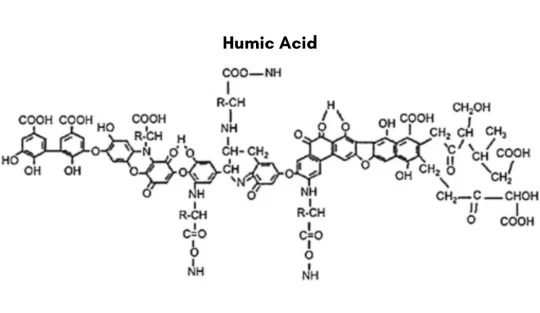
In the ever-evolving quest for optimal health and well-being, nature continues to reveal its hidden treasures. One such remarkable substance that has garnered attention in recent years is humic acid.
Derived from the natural decomposition of organic matter, this remarkable compound offers a wealth of potential benefits that can profoundly impact our overall health. From boosting immunity to aiding digestion and detoxification, humic acid emerges as a powerful ally in the pursuit of a balanced and vibrant life.
What is Humic Acid?
Credit: ScienceDirect.com
It is a complex organic compound formed through the decomposition of plant and animal matter over millions of years. It is a key component of humus, the rich, dark-colored material found in soil. This organic marvel is a treasure trove of beneficial compounds, including fulvic acid, amino acids, and various minerals.
The Formation Process: The formation of humic acid is a fascinating natural process that occurs over an extended period. As organic matter, such as leaves, bark, and other plant materials, break down, they undergo a series of chemical transformations facilitated by microorganisms.
This intricate process results in the creation of humic substances, including humic acid, which are essential for soil fertility and plant growth.
Health Benefits of Humic Acid:
- Immune System Support: Humic acid is renowned for its ability to bolster the immune system. It contains potent antioxidants and anti-inflammatory compounds that help combat oxidative stress and reduce inflammation, two key factors contributing to various health issues. By neutralizing free radicals and supporting the body’s natural defense mechanisms, it can strengthen immunity and enhance overall well-being.
- Digestive Health: The intricate structure of humic acid makes it an excellent ally for digestive health. It can bind to toxins and heavy metals, facilitating their elimination from the body. Additionally, it has been shown to promote the growth of beneficial gut bacteria, supporting a healthy gut microbiome. A balanced gut flora is crucial for proper digestion, nutrient absorption, and overall digestive function.
- Detoxification Support: In our modern world, exposure to environmental toxins and pollutants is almost unavoidable. It can play a vital role in the body’s detoxification processes. Its unique molecular structure allows it to bind to and facilitate the removal of heavy metals, pesticides, and other harmful substances from the body. By supporting the body’s natural detoxification pathways, it can help alleviate the burden of toxic overload.
- Skin Health: The antioxidant and anti-inflammatory properties of humic acid extend their benefits to skin health as well. When applied topically, it can help soothe irritated skin, reduce inflammation, and promote wound healing. Additionally, its ability to neutralize free radicals can help protect the skin from premature aging and damage caused by environmental stressors.
- Mineral Absorption: Humic acid has been shown to enhance the absorption and bioavailability of essential minerals, such as iron, zinc, and calcium. By forming stable complexes with these minerals, humic acid can facilitate their uptake and utilization by the body. This property makes humic a valuable supplement for individuals seeking to optimize their mineral intake and ensure proper nutrient absorption.
Sources of Humic Acid
While humic acid is naturally present in soil and water, obtaining adequate amounts from these sources can be challenging. Fortunately, humic acid supplements and extracts are readily available in various forms, including powders, capsules, and liquids.
These supplements are typically derived from ancient, highly concentrated humic deposits, ensuring a potent and concentrated source of this valuable compound.
Incorporating Humic Acid into Your Lifestyle
Humic acid can be seamlessly integrated into your daily routine in several ways:
- Supplementation: Adding a high-quality humic acid supplement to your daily regimen can provide a concentrated dose of this beneficial compound.
- Topical Application: For skin-related benefits, humic acid can be applied topically in the form of creams, lotions, or serums.
- Organic Farming: Supporting organic farming practices that prioritize soil health and the preservation of humic substances can indirectly increase your exposure to humic through the consumption of organically grown fruits and vegetables.
Frequently Asked Questions
Is Humic Acid Safe for consumption?
It is generally considered safe for human consumption when taken in recommended doses. However, it’s always advisable to consult with a healthcare professional, especially if you have any underlying medical conditions or are taking medications.
Can Humic Acid interact with medications?
While humic acid is generally well-tolerated, it is possible that it may interact with certain medications, particularly those that are metabolized by the liver. If you are taking any prescription drugs, it’s essential to consult with your healthcare provider before adding humic acid supplements to your regimen.
How much Humic acid should I take?
The recommended dosage of humic acid can vary depending on the specific product and the individual’s needs. It’s crucial to follow the manufacturer’s instructions or consult with a healthcare professional for personalized guidance.
Can Humic Acid be used topically?
Yes, humic acid can be applied topically for skin-related benefits. It is often found in skincare products, such as creams, serums, and lotions, due to its anti-inflammatory and antioxidant properties.
Is Humic Acid suitable for vegetarians and vegans?
Most commercially available humic acid supplements are derived from natural sources and are suitable for vegetarians and vegans. However, it’s always advisable to check the product label or consult with the manufacturer to ensure compatibility with your dietary preferences.


